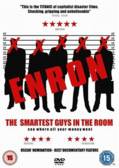"Ours
is an aggressive culture…" |
Jeffrey Skilling, ex-Enron big cheese |
Insecure, highly paid, monstrously greedy people in suits, untainted by ethics – like Gordon Gecko of Wall Street fame – think what they are doing, in distinctly male terms, is 'aggressive'. But then they have to significantly 'up' the machismo of what they do because of what they actually do. They sit at a desk and use computers and underling traders to fuck over the little guys to line their own and their company's pockets. It's a jungle out there. What guys! What big men! What power and unwieldy genitalia they must possess. Yes, you're a big cheese if you have the power to turn on and off California's electricity supply. Bravo, well done. I'm sure Mr. Smith, your teacher from 4th Grade, is now eating his hat after pronouncing you a loser in school. You've shown them. You great Gouda, you. But you are another word entirely if you choose to screw up a lot of people's lives turning that electricity off and re-selling it at inflated prices. These people do not just gallop after obscene profit. Not just profit – outrageous, bloated, GNP of small nations profit. But aggressive? These guys ought to go to L.A.'s South Central and ask the L.A. Bloods what they mean by aggressive...
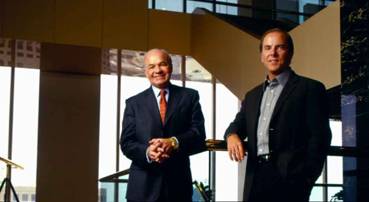
There is a word, a German word, for which we have no equivalent (outrageous given the enormity and scope of the English language). It is 'schadenfreude' and it means taking pleasure from another's misfortune. It's the "Yes!" when you hear Jonathan Aitken sliding down his sword of truth, the cheers that erupt when it's announced that Jeffrey Archer is actually going to jail. It's that little feeling (with a moral edge not covered by the German word) that there is fairness on this planet and every now and again the little guy gets a chance to cheer. Well, Enron going bust was a big high flying piece of 'schad' if it weren't for the fact that they took so many down with them. It's the equivalent of wishing misfortune on the captain of the Titanic because of something he did to you – and then hearing the whole ship went down.
It's a knee jerk reaction of mine as I'm sure it is with a lot of people. A high profile, fat cat company goes bankrupt and there is a little piece inside you (oh, OK, a big piece) that cheers and whoops and hollers. Bloated corporations that make something that people value are one thing. Bloated corporations that find the cracks in legality to spread their poison and create profit where humble 'break even' used to live, are something else entirely. It's those companies that trade on the invisible, the value of something not concrete but illusory. Playing the market. There was a leash on such companies called Regulation. Every fat cat's dream on every crooked board has been to smash that rule that kept the corrupt only semi-corrupt. The once mighty Enron contained a great many decent people whose futures were entwined with the performance of the company and once it went, so did their pensions. It's a sad story but a very human one and the reason why the movie Enron is so compelling. If you watch it with feet up, hindsight, a liberal view of the world, a fat-cat disgust rating of 9.9 and a joy seeing the crooks brought to bear, then you'll love every blessed minute.
Enron gives you hope in a world in which hope is now mustered only by those dropping toast. The big hopes have faded. The world is in a sorry state and butter side up is all any of us can reasonably hope for. Ah ha, but there will come changes with political upheavals – there always are. Well, the Blairs and Bushes of this world have fanned an ideological wildfire that will have reverberations long after those two clowns have passed on (to be judged by their own God, sheesh). People will burn in this for generations. Iraq is merely a source of tinder and spark.
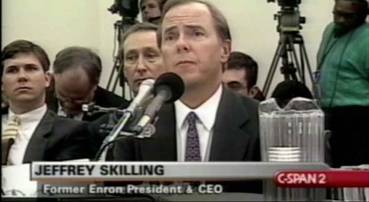
You can think of big business, if you're not in it, as something people get very worked up about. We are told that stockholders plummeted to their deaths in the suicidal aftermath of the great Wall Street Crash of the 30s but it is inconceivable to me that someone would take their own life because they were suddenly made poor. What happened to the drive that kept them wanting to acquire wealth? It must be replaced by a hopelessness from which they felt they had no escape. Enron: The Smartest Guys in the Room starts with a suicide just to up the ante a bit. It's a judicial bit of re-enactment that sets the tone nicely. Things are going on here which one man felt, if exposed, would ruin his life so he took it himself. Staggering.
Enron used to trade in energy. Little more than the arm-wavers at any horse race, they would try and second guess markets and plough money into what they ardently believed would yield profit. And Enron seemed to have the magic touch and other companies gawped at their good fortune. As long as this 'luck' lasted, the more suspicious people became. One of these people, Enron's own Mike Muckelroy, would ferret out the shady dealings, tell the boss and assume things were taken care of. Business in all areas was not up to scratch and as the illegal activities went on, the CEO at the time, Kenneth Lay, simply encouraged the deceit. Eventually someone took the fall leaving Enron unscratched by the sham. While the fall guy served a prison term, Lay needed to find another way to keep the millions flowing into the company.
Enter hot shot Jeffrey Skilling. When asked by Enron's interviewers, "Do you consider yourself smart?" he replied "I'm fucking smart." So why do such intelligent human beings have such few reserves of common sense? It's like Ambition and Greed play a tag wrestling team against the diminutive and shaking Integrity. Honesty (Integrity's manager in the ring) gets pummelled as easily. Let's take a simple look (alas, I am no accountant nor economist so it has to be simple and I accept, naïve look) at one of Enron's book keeping practices as demanded by Skilling as a condition of his appointment. It's known as 'Mark to Market' accounting and is as fantastic as any fairy tale.
You sign a deal and whatever worth you think the deal will mean to the company, you publish on your books. Note the word 'will', future tense. Well, the future was tense alright. Let's say Enron signs a deal with Joe Bloggs water company. On its books it can forecast a two billion gallon distribution in ten years. The fact it distributes a hundred thousand gallons by the end of this fiscal year is beside the point. Enron publish the future figure (pure fiction) and guess what? Their stock rockets – illusory worth, an illusion that will be revealed as such sooner or later. There is even a skit that Enron employees performed (including a lead role for Mr. Skilling) in which Skilling comes up with an even better way of accounting than 'Mark to Market'. In the spoof (intended to make Enron's staff and shareholders feel secure about all this phantom money coming in) Skilling says he's discovered HFV – 'Hyperthetical Future Value'! The problem is of course, a spoof is not a spoof when it's identical to what's being spoofed.
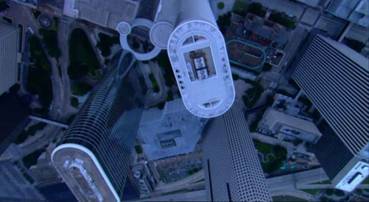
And everyone but everyone bought into the fantasy.
Huge numbers of reputable financial institutions dipped their toes into the black Enron water and believed that God was actually neither black, female or gay. No, better than that. God was a philanthropic economist! Money was being made, financial plates being spun on invisible poles, illusory sums spread out to cover real practicalities. And guess what? Real requires real. It's telling that Skilling jumped ship 18 months before Enron sank (oh, he sold his shares of course) and left Ken Lay to steer the rudderless behemoth to its doom. Even Lay cashed in before the end – these men's cynicism is too depressing for words, not to mention the other Exec who left the company with $250 million and a stripper on his arm (see the movie for details, they will surprise you). Nice to hear Philip Glass' opera 'Einstein on the Beach' popping up on the soundtrack over the strippers. It's all in the numbers...
One small smile to end on: the number of phoney companies created to absorb imaginary wealth had to have names and it fell to the 'masters of the universe' to create them. Of course, given the average age of these low-lifes, who knew full well what they were doing, they would come up with gems such as 'M. Yass' ('my ass?), 'Raptor', 'Chewie' and 'Jedi'. It's a nice detail that one of the companies (a regulatory board) that slapped Enron hard had an acronym in the same spirit. You'd be forgiven thinking that FERC had to be made up but no. It's real and stands for 'Federal Energy Regulatory Commission'. Ferc me. You just can't top real life. But then CEO Ken Lay adds another tragic layer to the story (not included in the movie)... At the end of all this, he's convicted of fraud on a massive scale (he with his tens of millions) and then promptly dies of heart disease in the summer of this year. You can't take it with you Ken, but you did take everyone else's...
| sound and vision |
Enron's original material (anamorphic 16:9) is shot on HD and looks sparkling and sharp and suits the subject matter, which of course is presented mostly as interviews. There is, however, a great deal of archive material that, quality-wise, goes from 35mm film all the way down to what appears to be VHS recordings of Enron meetings. You know what? It's all grist to the story mill. If it all looked glorious in HD, the story would have been compromised. Shabby looking material (I can't imagine why) lends credibility to documentaries. Is this the same universal constant that makes all important closed circuit TV material too grainy to make anyone's features out?
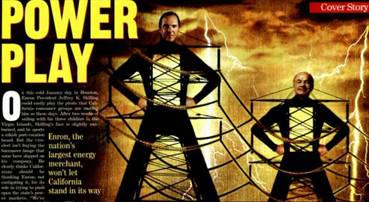
The Dolby 5.1 surround sound is clear and (believe it or not) most effective in terms of the rear speakers on the Special Features menu! I honestly thought the rolling thunder was real but nope, it's the menu.
The Subtitling (English only) is Feature specific but there is a Hearing Impaired subtitle option.
| extra features |
Audio Commentary – Writer/Director Alex Gibney's commentary is almost a presentation of another two hour movie, the italics or footnotes to what's in the feature, the gantry to the movie's Saturn V rocket so to speak. It's fascinating for that reason alone. There are a few notable moments. There's a glorious aerial over oil refineries in the early morning and Gibney, extolling the virtues of HD, says "I could watch this tracking shot forever," and the shot cuts immediately after he finishes the word 'forever'. He couldn't have timed that accidental irony any better.
The Making Of... – this is essentially an interview with writer/director Alex Gibney that lasts a few seconds shy of 14 minutes. It's revealing but again, feels like stuff he would have wanted to tell us but couldn't justify a longer running time. There is also (as there is bound to be) repeated information but it doesn't detract.
Deleted Scenes – 19 minutes and 33 seconds of interesting scenes (5 in total with black spacing between them – you have no option to choose each separately) which further highlight the high dudgeon Enron marched into with so few eyes open. A few stories (each scene is a mini story or a few shots more of what's on offer in the main feature) are genuinely startling (Enron's assumption of technological backwardness regarding California State's IT equipment). They are worth a dip, no question but the weight of the absence of common sense (can the absence of something be heavy?) is mind-numbing.
| summary |
For all fans of 'schadenfreude' or those of us who are often demeaned by corporate disinterest, Enron is the perfect antidote. There is justice in the world and seeing those smug, fat cats who regard $100 million as small change getting their comeuppance is very satisfying. It's a damn fine piece of investigative documentary and a superb example of how to take something complex and full of labyrinthine figures into a near Shakespearean fall from grace. Curious sub-note. There are strippers in the film with naked breasts (yes, strippers have naked breasts, folks) and a few cuss words. The DVD gets a '15' rating with a warning of 'strong language'. Are naked breasts now generally accepted as things 15 year olds can see and not have to be warned of? That's a bit of a change. A refreshing one too.

